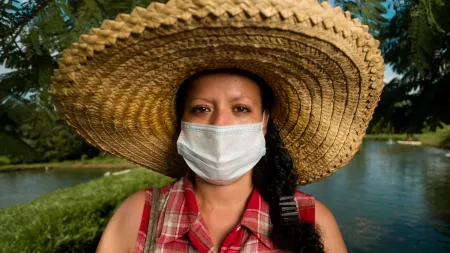“Fill yourself with hope and strength and show what you are made of. Do not sit there with your arms crossed. You can be an entrepreneur,” Maria Rivera, Honduran PROSPER II project participant.
As is always the case, people who are building the solutions say it best. Maria is part of the Cargill PROSPER II project, which ran from 2019-2022. CARE and Cargill’s partnership extends more than 60 years, and has covered a variety of projects and activities. Since 2008, CARE and Cargill have reached more than 4.6 million people, 600,000 people directly and 4 million indirectly, through 34 projects in 13 countries. Of those reached, more than 2.4 million are women.
PROSPER II covered 7 countries (Ghana, Cote d’Ivoire, Costa Rica, Guatemala, Honduras, Nicaragua, and Indonesia), and it the first time the CARE/Cargill partnership can report on impact numbers. In years that included COVID-19, the conflict in Ukraine, several hurricanes, and major climate shocks, people in the project still saw a lot of progress. The project reached 190,519 people directly and 1.8 million indirectly.
Not only does this work for people in the project, but the ideas are so powerful that governments and communities are scaling them on their own.
“The project values us as women and it values what we do,”Maria Lazara, project participant from Guatemala.
What changed?
- People graduated out of poverty. 54,000 people who lived in poverty at the beginning of the project are now living above the national poverty lines. In 4 of 7 countries, fewer people live below the poverty line.
Cote d’Ivoire saw poverty with project participants move from 62% to 4%. Guatemala from 52% to 38%, and Ghana moved from 30% to 22%. - People earn more money. In Central America producer income has tripled (to $1,499). In Ghana, income increased $630 per person per year. Income went up 53% in Cote d’Ivoire.
- People eat more food. 53,000 people are now food secure. Cote d’Ivoire cut food insecurity in half. In Guatemala there was a 29 percentage point reduction in food insecurity. Ghana went from 38% to 14% of people who had to go an entire day without eating.
- People grow more food. In Honduras, people grew 124 tons of food—and donated 22,224 pounds to people who needed it. Corn and bean productivity per hectare doubled in Honduras. In Nicaragua, sorghum production went up 36% for project participants, even in the middle of a hurricane.
- People are eating healthier food. Kids in Indonesia are 23 percentage points more likely to eat fruit (69%). More than twice as many Ivorians are picking healthier food options (97%). In Ghana 97% of people are eating more vegetables (up from 70%).
- Gender gaps are closing. There are 33% more women in leadership in Ghana, and 54% more in Cote d’Ivoire. In Cote d’Ivoire, 57% of women can read and write; 47% more women can make agriculture decisions. In Indonesia, women are leading WASH committees.
- More kids are in school. In Indonesia, where the project focused on WASH in schools, student absenteeism due to diarrhea fell from 8.8% to 2.4%.
- Other people are investing money and scaling ideas. In Indonesia, the government invested $650,000 to replicate the model in 80 schools (PROSPER II covered 10). Communities in Ghana spent $47,619 of their own money to complete action plans.
In Guatemala, 45 government trainers are replicating the curriculum with 2,841 people. In Honduras, $20,410 of government spending pays for 12 trainers to do 1,680 extension visits. New gender policy and more budget towards women’s municipal office.
“I didn’t know I could grow all the food needed to give my family good nutrition until I was trained by CARE on home gardening. Today I grow all the vegetables we need in my backyard,”Ghanaian project participant, Betty Awuah.
How did it happen?
- Savings groups. The project worked with 23,109 savings group (VSLA) members, who saved on average $50 per member. That adds up to $1.2 million in savings, and the groups gave out $1.4 million in loans.
- Focus on gender equality. The project hosted gender dialogues with 29,974 people to focus on gender equality and women’s leadership.
- Adapt to COVID-19. When COVID-19 hit, both Cargill and CARE pivoted. Cargill gave $380,000 gift from Cargill for COVID-19 emergency response in Central America and Indonesia. CARE teams found ways to save costs in Ghana, Cote d’Ivoire, Indonesia to pay for handwashing stations and COVID-19 prevention messaging.
- Build on structures and trust. The PROSPER teams Leveraged existing structures, platforms, and community entry points to mitigate spread of disease. They did awareness raising and education on safety and prevention against COVID-19 through public community radio, infomercials, and hosted messaging to address vaccine hesitancy and increase uptake.
- Support and train for growing more food. In addition to community gardens in most countries, or family and school gardens to grow more vegetables, PROSPER worked with farmers to adopt climate-smart and resilient practices that help them grow more food even when there are shocks.
- Work with schools. Guatemala and Indonesia worked with schools to teach nutrition classes and health behaviors. In Indonesia, they call it the 'little doctor' program. In Guatemala, it’s not just CARE staff, but also Cargill employees who help build school gardens and run training programs to promote healthy nutrition.
- Invest in infrastructure. From school toilets to gardens to pumps in cocoa fields, the project teams all found ways to partner with communities to build structures they needed and that communities would prioritize investing in.
Want to learn more?
Check out the project evaluation. Or take a look at the fabulous story from Barbara in Ghana on what changed for her.
